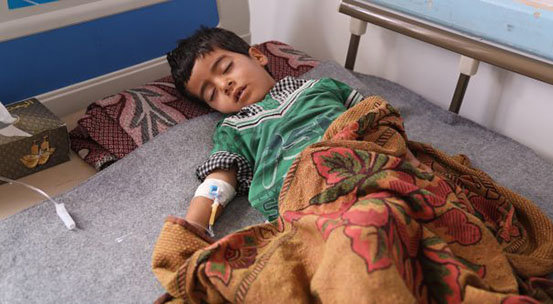US-Saudi Aggression Prevents all Possible Measures to Face Cholera Outbreak in Yemen
Yamanyoon
Since March 2015, the US-Saudi aggression on Yemen has used tactics and strategies that amount to war crimes and crimes against humanity. Humanitarian assistance and imports of food, medicine and fuel have been blocked.
Food production and distribution facilities, including markets and water wells, have been bombed. Schools, hospitals and other infrastructure essential to the survival of the civilian population have been destroyed. Predictably, the result has been the world’s largest humanitarian crisis, with mass starvation, outbreaks of cholera and dengue fever, and the internal displacement of millions.
The United Nations have deemed the situation in Yemen the world’s worst humanitarian crisis. In the midst of this, the largest and fastest spreading cholera outbreak recorded since the WHO began recording cholera outbreaks in 1949 has erupted. The disease has affected over 1 million people and caused almost 2,500 deaths. The United Nations estimates that 16 million of the 29 million people in Yemen lack access to safe water and basic sanitation. The population in Yemen has experienced two outbreaks of cholera; the first occurred between September 2016 and April 2017, and the second began later in April 2017 and has since resulted in more than 1.2 million suspected cases, children account for 30 percent of the infections.

The cholera and starvation that is currently afflicting Yemenis are completely man-made and the product of a brutal, protracted war and the ongoing silence of the international community. If caught early, cholera can be treated with oral hydration salts, though more severe cases require intravenous fluids and antibiotics. But the bacterium found in food and water sources has overwhelmed Yemen because its health-care facilities and infrastructure have been devastated.
Freeman Spogli Institute has documented at least 75 instances in which US-Saudi airstrikes appear to have purposely caused damage to water, health and sanitation facilities in the northern part of the country. Despite repeated calls by the international community to protect these public health sites — as is required by international law — the bombings continued. The United States and other Western powers have been indirectly complicit in these airstrikes on civilian water and sanitation targets, as these global powers have provided the weaponry, intelligence, and until very recently, the refueling capacity to support Saudi air attacks. The US-Saudi aggression in November 2017 closed the majority of airports, seaports and land crossings. This had the immediate effect of halting the flow of goods into Yemen, which relies almost exclusively on imports for food, fuel and medicine.

Moreover, the main seaport to Yemen, Hodeidah, has been bombed and later blocked, disrupting the supply of aid and other supplies into the country. The bridge that used to serve as the main supply route to the capital, Sana’a, has been bombed and so have hospitals and other medical facilities. The United Nations Office for the Coordination of Humanitarian Affairs (UNOCHA) has estimated that “16 million [people] lack access to safe water and sanitation and 16.4 million lack access to adequate healthcare”. The costs of food, water, fuel, medicines and other basic commodities have increased dramatically, lowering overall resilience towards cholera in Yemen even further.
Cholera outbreaks continued in the current year, as the Ministry of Public Health and Population of Yemen reported 6718 suspected cases of cholera with eight associated deaths during epidemiological week 7 (11 – 17 February ) of 2019. Severe cases constitute 12 percent the total. The outbreak has affected 22 of 23 governorates and 311 of 333 districts in Yemen.
From week 4 to week 6 in 2019, the trend of weekly reported suspected cholera cases decreased by 13% at the country level, although 224 districts have reported suspected cholera cases within the last three weeks. The governorates reporting the highest number of suspected cases of cholera during this reporting period were Amanat Al Asimah (1152), Al Hudaydah (852), Ibb(775), Dhamar (671), Arman (597), and Sana’a (591).
On Sunday, President Mehdi Al-Mashat discussed with the Minister of Health and Population the health conditions and the efforts exerted to confront the epidemics and diseases that have spread as a result of the aggression, siege and systematic targeting of the infrastructure of the health sector. The meeting tackled the epidemiological situation of cholera in Yemen, the efforts exerted by the Ministry and the health facilities to confront it, and the coordination aspects with concerned bodies and international organizations in this regard.
This report originally ran on Almasirah English





